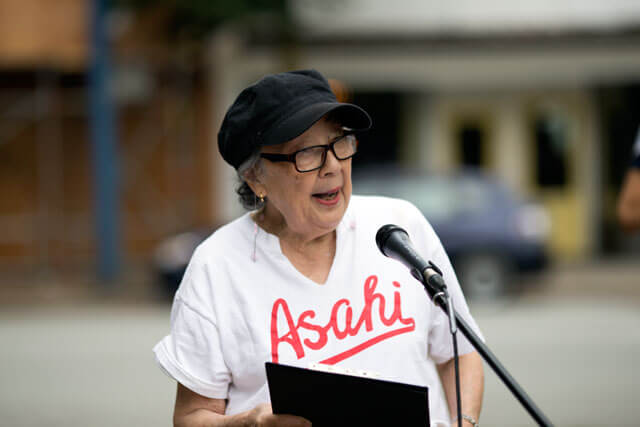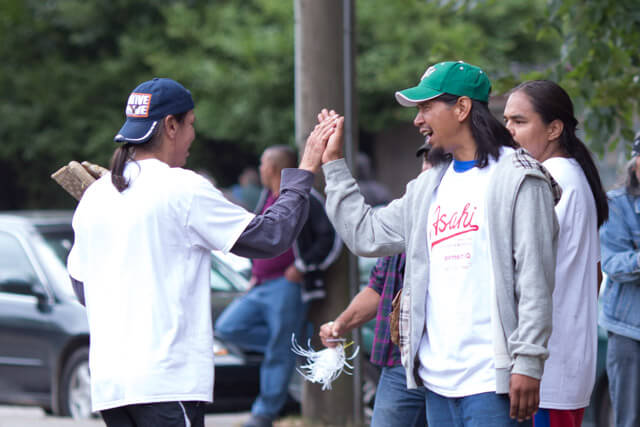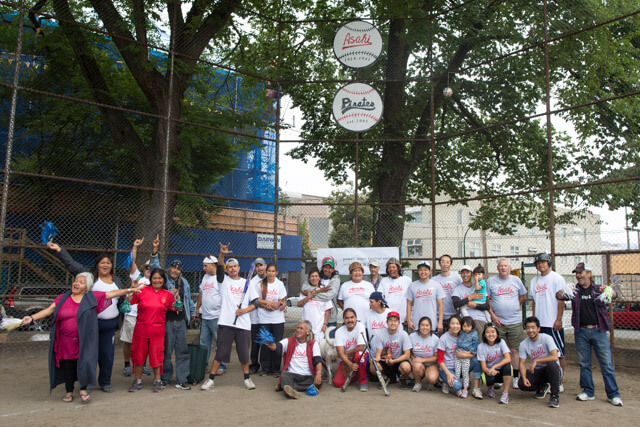It was a celebration of Japanese Canadian history and community at the 10th annual Asahi tribute baseball game, which took place at Oppenheimer Park in Vancouver, British Columbia last weekend.
The Asahi was a Japanese Canadian team that played in the industrial – or semi-professional – leagues in Vancouver from 1914 to 1941. During World War II, the team disbanded when Japanese Canadians were sent to internment camps by the Canadian government.
“[The tribute game] allows us to remember our history in a really holistic way,” explains Angela Kruger, event organizer and member of the Japanese Canadian Young Leaders of Vancouver (JCYLV). “It’s transposing our memory of the past into an event that means something for the current Japanese Canadian community and the Downtown Eastside.”
 Asahi faced discrimination
Asahi faced discrimination
The Asahi originally formed in Oppenheimer Park, then known as Powell Grounds, in an area that was made up of Japanese immigrants.
“Japanese Canadians daily struggled with a racist society,” recalled Japanese Canadian historian and activist Grace Eiko Thomson (pictured right) to a crowd of 50 people at Saturday’s game.
The Asahi was no exception, as the only ethnic team playing in the industrial leagues, she said, adding that Asahi players were a foot smaller than their opponents, standing at 5-foot-something.
[P]layers were called racist slurs, booed by fans and treated unfairly by umpires.
Before the team was recognized in society, players were called racist slurs, booed by fans and treated unfairly by umpires.
However, in 1922, the team learned the now notorious “brain ball” strategy, which encompassed bunting and stealing bases.
“When they were playing their ‘brain ball’, people discovered they were really good,” explains Lorene Oikawa, president of the Greater Vancouver Japanese Canadian Citizens’ Association (GVJCCA). Oikawa’s grandfather, Kenichi Doi, was a pitcher for the Asahi.
“They began to see beyond the race,” adds Oikawa. “Caucasian people were coming to games and really enjoying them, so for a brief moment, forgetting about the race aspect and just seeing the baseball, that’s pretty cool.”
 Bringing communities together today
Bringing communities together today
Overcoming struggles like racism and celebrating being treated as equals are some aspects that the annual Asahi tribute game is based on.
Each year, the Downtown Eastside forms its own team to participate in the tribute game, called the Pirates. Other teams are formed by anyone else interested in participating.
This year, three teams participated in a friendly game of softball. Teams ranged in age with people coming from all over B.C.’s lower mainland.
Part of the community building of the event includes a free barbecue and an opportunity for players and spectators to eat lunch together.
“To see everybody in the park smiling and laughing or cheering their friends on, that was totally amazing.”
“To see everybody in the park smiling and laughing or cheering their friends on, that was totally amazing,” says Kruger, who, despite organizing the event, had never been to a game before.
The experience also brings back familial memories to some of the participants.
For example, Alex Murata says his favourite part about the tribute game was playing on the Asahi home field with his dad, since his grandfather used to play baseball for a local team in Cumberland, a small village on Vancouver Island.
 Learning from the Asahi
Learning from the Asahi
When Eiko Thomson speaks to the crowd each year about the team’s significance, she makes sure to include its impact on Canadian history and human rights.
Following Japan’s attack on Pearl Harbor in Hawaii in 1941, 22,000 Japanese Canadians were forced to leave their homes and were sent to internment sites.
The Asahi were separated and never played as a team again.
However, the sport of baseball continued to bring communities together, much like today’s tribute game. Japanese Canadians continued to play baseball while interned, and even four years later, when the war ended and they were dispersed across Canada.
“It includes the early immigrants’ history, as well as the wartime history and the racism prior to the war.”
“Asahi is the best vehicle for telling the [Japanese Canadian] story because it spanned for 27 years,” says Eiko Thomson. “It includes the early immigrants’ history, as well as the wartime history and the racism prior to the war.”
While the Asahi tradition continues in Vancouver, this year fewer people came out to play.
In previous years, the Nikkei National Museum and Cultural Centre in Burnaby, a suburb of Vancouver, had organized the event. This year, the museum stepped down, prompting the JCYLV, a committee of the GVJCCA working to empower Japanese Canadian youth, to take its place.
Everything came together only weeks before the event for organizers who also included the Powell Street Festival Society, Carnegie Community Centre and Oppenheimer Park.
“It was a little chaotic in the beginning, but it really became a gradual sense of calm,” says Kruger. “The game was really great.”
Next year, organizers would like to see the event grow by sharing the Asahi history year-round and including more family friendly elements. Some would also like to include screenings of relevant films to spark a discussion on the impact of the team.
Freelancing by way of writing, photography and videography. Most recently, combined reporting and photography skillset to produce a multimedia exhibition at the Nikkei National Museum.





